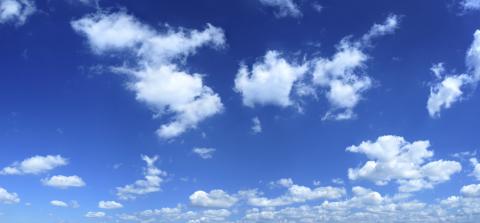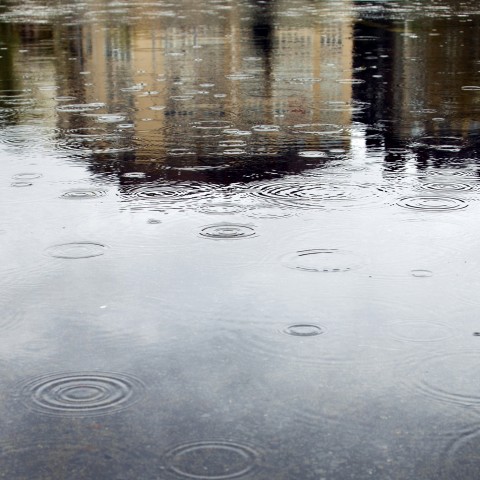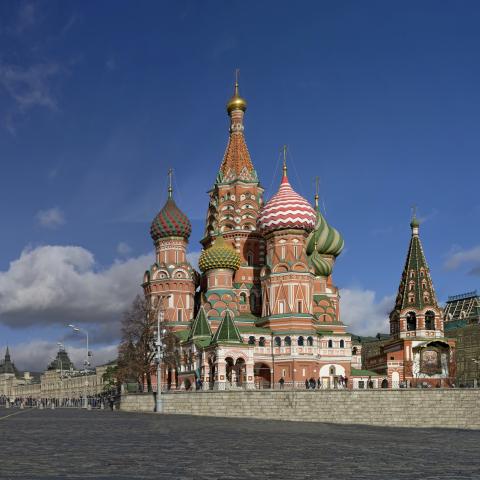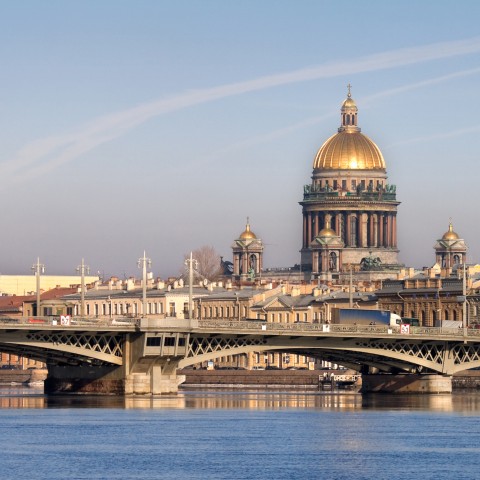Russia is the only country in the world that lies in eight climate zones. That means that the general weather in Russia is very different from one region to another. Whether you want to travel or have a business visit in mind, being able to talk about the weather will be very useful. Talking about the weather in Russian can help you keep your socks dry, your body warm, and your face without sunburns. Sounds promising, doesn’t it?
So, let’s learn Russian weather vocabulary with RussianPod101.com, and get a glimpse of St. Petersburg, Russia weather too!
Table of Contents
- Basic Vocabulary: How’s the Weather?
- Advanced Vocabulary about Weather in Russia
- Russian Weather: Let’s Practice a Conversation
- Weather in Russian Cities
- Russian Weather Forecast
- Conclusion
1. Basic Vocabulary: How’s the Weather?
[How’s the weather?]
So, how does the word “weather” sound in Russian? It’s погода (pogoda). You may notice that the word год (god), meaning “year,” is right in the middle. These two words have emerged from the same ancient word, but right now they don’t have a common meaning. This nice detail should still help you remember this word better, though.
In the following sections, you’ll learn the most important weather terms in Russian, so that discussing the weather in Russian will be a piece of cake. ;)
Asking about the Weather
To ask about the weather in Russian, use this question:
- Как погода?
Kak pogoda?
“How’s the weather?”
This is the simplest question about the weather, and you can use it anytime. Literally, it means “How (is) weather?”
Describing the Weather in Russian
Now let’s learn how to describe the weather in Russian by saying if it’s cold or warm:
- Морозно
Morozno
“It’s frosty.”
This word is an adverb that comes from the noun мороз (moroz) meaning “frost.”
- Холодно
Kholodno
“It’s cold.”
The noun for this is холод (kholod) meaning “cold.”
- Прохладно
Prokhladno
“It’s cool.”
The noun for this is прохладa (prokhlada) meaning “coolness.”
- Тепло
Teplo
“It’s warm.”
The noun for this is теплота (teplota) meaning “warmth.”
- Жарко
Zharko
“It’s hot.”
The noun for this is жара (zhara) meaning “heat,” or “hot weather.”
Before all of these adverbs, you can always put modifiers:
- Oчень (ochen’) meaning “very”
- Довольно (dovol’no) meaning “pretty,” or “kind of.”
So, just imagine that your sister went for a run early in the morning and has just returned home. You haven’t been outside yet, so you may have the following conversation:
- You: Как погода? (Kak pogoda?) — “How’s the weather?”
- Your sister: Довольно тепло (dovol’no teplo) — “It’s pretty warm.”
More Weather Phrases in Russian
But what if the weather is windy or if it’s raining? Let’s learn how to tell that:
- Дождливо
Dozhdlivo
“It’s rainy.” - Идет дождь
Idyot dozhd’
“It’s raining.” - Идет снег
Idyot sneg
“It’s snowing.” - Ветрено
Vetreno
“It’s windy.” [The noun is ветер (veter) meaning “wind.”] - Душно
Dushno
“It’s stuffy.” [Usually, it gets stuffy before a storm.] - Солнечно
Solnechno
“It’s sunny.” [The noun is солнце (solntse) meaning “sun.”] - Туманно
Tumanno
“It’s foggy.” [The noun is туман (tuman) meaning “fog.”] - Пасмурно
Pasmurno
“It’s cloudy.”
Use this phrase when the clouds are heavy, so no sunlight can force through it. It’s dull and a bit dark.
- Ясно
Yasno
“It’s not cloudy.”
Basically, this word is the opposite of пасмурно (pasmurno) and refers to a clear sky. You can also use the word ясно (yasno) when you want to confirm that you understood something. But it’s better to use it that way only in informal conversations.
- Облачно
Oblachno
“It’s cloudy.”
Use this phrase when the clouds are light, and you can see the sun here and there.
- На небе радуга
Na nebe raduga
“There is a rainbow in the sky.”
So, let’s clarify the nouns here: небо (nebo) means “sky” and радуга (raduga) means “rainbow.”
Now you’re ready to go out into the big Russian world, young learner! Oh wait, don’t forget to grab the word зонт (zont), or “umbrella,” on your way. Well, just in case. ;)
If you feel a bit unsure about the pronunciation, you can practice with our audio lesson about Russian weather.
2. Advanced Vocabulary about Weather in Russia
[It’s raining.]
1- Asking about the Weather
There are a lot of ways to ask about the weather in Russian. Let’s see which one is best for various situations:
- Как погода?
Kak pogoda?
“How’s the weather?”
This question is used in conversations when it’s convenient; it doesn’t need a serious or long answer. It’s often asked to know the other person’s opinion about the weather: “So, how is the weather for you?” This question can be asked in both formal and informal conversations.
- Как погодка?
Kak pogodka?
“How’s the weather?”
The suffix –к– makes this question more easy-going and fun. It’s used only in informal conversations.
- Какая сегодня погода?
Kakaya segodnya pogoda?
“How’s the weather today?”
This question can also be asked in both formal and informal conversations. But when it’s used in informal ones, it may feel a bit rigid.
- Как там на улице?
Kak tam na ulitse?
“How is it outside?”
A brilliant and lively question, don’t hesitate to ask it in any formal and informal situations. Use it when someone has just come from outside.
- Какой на завтра прогноз погоды?
Kakoy na zavtra prognoz pogody?
“What’s the weather forecast for tomorrow?”
This question can be asked if you know that someone has specifically watched or read a weather forecast. By the way, “weather forecast” is прогноз погоды (prognoz pogody).
- Какую погоду обещают на завтра?
Kakuyu pogodu obeshchayut na zavtra?
“What is the weather forecast for tomorrow?”
This is another version of the previous question, but with more familiarity. For example, it could be asked between family members.
2- Answering about the Weather
Now, let’s learn different constructions for answering weather-related questions, using common weather words in Russian:
- Идёт… (Idyot…) — “It’s…”
- …дождь (…dozhd’) — “…raining.”
- …снег (…sneg) — “…snowing.”
- …град (…grad) — “…hailing.”
- Будет… (Budet…) — “It will…”
- …дождь (…dozhd’) — “…be raining.”
- …снег (…sneg) — “…be snowing.”
- …град (…grad) — “…be hailing.”
- …холодно (…kholodno) — “…be cold.”
- …тепло (…teplo) — “…be warm.”
- Вчера шёл… (Vchera shyol…) — “It was …”
- …дождь (…dozhd’) — “…raining.”
- …снег (…sneg) — “…snowing.”
- …град (…grad) — “…hailing.”
- Завтра будет… (Zavtra budet…) — “It will be… tomorrow.”
- …холодно (…kholodno) — “…cold…”
- …тепло (…teplo) — “…warm…”
- На завтра обещали… (Na zavtra obeschali…) — “The weather forecast says it will be… tomorrow.”
- …дождь (…dozhd’) — “…raining…”
- …снег (…sneg) — “…snowing…”
- …град (…grad) — “…hailing…”
Learn more Russian words and expressions about the weather with our word list.
If you wanna get into the heart of the language and know all the exciting local expressions, check out our video about slang related to the weather.
3- Talking about Temperatures
Russian people use the Celsius scale when they talk about the weather and temperature. When speaking, they usually omit the word градусы (gradusy), or “degrees.”
- На улице минус (Na ulitse minus) — “The temperature is lower than 0 °C outside.” [Literally: “It’s minus outside.”]
This phrase is commonly used when the weather is switching between plus and minus temperatures.
- На улице плюс (Na ulitse plyus) — “The temperature is higher than 0 °C outside.” [Literally: “It’s plus outside.”]
- На улице ноль (Na ulitse nol’) — “The temperature is 0 °C outside.” [Literally: “It’s zero outside.”]
- Плюс десять (Plyus desyat’) — “+10 °C.”
- Минус пять (Minus pyat’) — “-5 °C.”
For advanced learners, it would also be useful for you to understand Russian radio or TV weather forecasts. Watch our video to learn useful expressions and practice your listening skills.
3. Russian Weather: Let’s Practice a Conversation
Let’s have a look at two conversations about the weather to learn a couple more useful expressions.
Conversation 1
Аня: Ну что, какая сегодня погода? (Nu chto, kakaya segodnya pogoda?)
Вова: Да непонятная – то дождь, то солнце. (Da neponyatnaya—to dozhd’, to solntse.)
Аня: Ясно. Очень холодно? (Yasno. Ochen’ kholodno?)
Вова: Скорее не холодно, а ветрено. Одевайся теплее и возьми с собой зонт. (Skoree ne kholodno, a vetreno. Odevaysya tepleye I voz’mi s soboy zont.)
Anya: So, how’s the weather today?
Vova: Well, it’s odd—one moment it’s raining, another one—it’s sunny.
Anya: Oh, I see. Very cold?
Vova: Rather windy than cold. Wear warmer clothes and take an umbrella.
What city do you think it’s in? :) Sounds like St. Petersburg, Russia weather. We’ll talk about that later in the article. ;)
Conversation 2
Катя: Какую погоду обещают на субботу? (Kakuyu pogodu obeshchayut na subbotu?)
Оля: Сейчас гляну. Так, солнечно, плюс двадцать три. (Seychas glyanu. Tak, solnechno, plyus dvadtsat’ tri)
Катя: Ооо, классно! Как у тебя со временем? Давай в парк? (Ooo, klassno! Kak u tebya so vremenem? Davay v park?)
Оля: Заманчиво. Давай я тебе чуть позже скажу, смогу или нет? (Zamanchivo. Davay ya tebe chut’ pozzhe skazhu, smogu ya ili net.)
Катя: Хорошо! (Khorosho!)
Katya: What’s the weather forecast for Saturday?
Olya: Let me see… Well, it’ll be sunny, +23 °C.
Katya: Oh, cool! Do you have time? Let’s go to the park!
Olya: Sounds nice (Tempting). Let me tell you a bit later if I can go or not.
Katya: Sure!
As you can see, talking about the weather in Russian is always related to making plans for holidays. Listen to our audio lesson for more examples.
4. Weather in Russian Cities
Now let’s talk about the weather in different cities, from weather in Moscow, Russia to the more extreme Oymyakon, Russia weather. We’ll also cover Russian weather during the most popular touristic months: Russian weather in June, July, and August. By the time you’re through with this section, you should have a much easier time talking about the weather in Russian year round!
1- Weather in Moscow, Russia
[Moscow.]
Moscow has a humid continental climate. That means the Russian capital has all four seasons: зима (zima) meaning “winter,” весна (vesna) meaning “spring,” лето (leto) meaning “summer,” and осень (osen’) meaning “autumn.”
Russian winter temperatures are usually about -10 °C, but they can drop to -20 °C or even lower for a couple of weeks (usually in December). We’ve prepared a couple of tips for you if you’re planning your visit to Moscow in winter:
- Bring non-slippery boots. Even though Moscow’s government spreads chemical reagents to eliminate ice on the roads and make them safer for pedestrians, that refers only to the main roads. A lot of little ones, especially near courtyards, stay too slippery and dangerous. Make sure to check if your shoes are good for slippery surfaces.
And of course, your shoes must be very warm to protect your feet from low temperatures. You’d be surprised how fast your feet can freeze in Russia if your boots aren’t warm enough.
- Prepare layered clothing. If you’re going to use underground, or just take a tour to see gorgeous Moscow metro stations, keep in mind that it’s really warm down there compared to the weather outside. You should be able to take off your jacket or feel comfortable even if you sweat a bit—that’s what layered clothing is for.
The first layer should keep your skin dry by transferring all the moisture to the next level. The second level keeps that moisture and also provides warmth. The third layer protects from wind or water/snow. The more layers you have on you, the warmer you feel thanks to the air between layers.
The weather Moscow experiences in summer is usually very mild. The temperatures are around 23 °C (73.4 °F). They may rise to 30 °C (86 °F), but usually not for a long time. The Moscow underground is usually a pretty cool place, so make sure not to catch a cold from temperature switches.
Also, the central part of Russia doesn’t have a lot of sunny days, so Moscow citizens catch every chance to catch the sun during summer. You’ll see a lot of people lying on the grass in the parks, and even in small public gardens, taking sunbaths.
Russian weather in June is unpredictable, especially in Moscow. It may be warm, around 15-20 °C, but it can also get cold to around 5-10 °C. Sometimes it might even start snowing. Yes, in June! But don’t start packing your winter clothes yet; it’s more like an exception to the rule. ;)
Moscow autumn can be divided into two parts. The first part lasts from September to the middle of October. It’s still pretty warm, the tree leaves become beautifully golden, the air smells of the sun. There’s usually a quick return of summer weather that lasts about a week or two in the first part of September. Russians call it бабье лето (bab’ye leto) meaning “indian summer,” or more literally “girl’s summer.”
The second part of Moscow autumn is mostly rainy, windy, and cold. There can even be rain with snow in November. Make sure to bring shoes that are both warm and waterproof.
Russian weather in spring is usually sunny and nice. Some people continue wearing winter jackets until it gets very warm, while other people change into long coats. As the temperature goes up and down, a lot of people get the flu. To avoid the flu, get a vaccination in the hospital, as many Moscow citizens do.
If you want to know more about Moscow, listen to our audio lesson “How much do you know about Moscow?” Also learn how to ask “Have you been to Moscow?” in Russian.
2- Weather in St. Petersburg
[Saint-Petersburg.]
St. Petersburg weather is usually more humid and windier than Moscow weather. Temperature change is usually smaller than in the capital, thanks to the sea nearby. But because of the high humidity, the cold seems even more severe.
Some tips for those who plan to visit Saint-Petersburg:
1. If you’re thinking about whether you should wear extra clothing or not, just wear it. It’s never too warm because of the cold, humidity, and strong winds.
2. After doing that…put some extra clothes into your bag. You’ll be happy about bringing them along later. :)
3. If you catch colds easily, always wear a scarf.
The best season to visit Saint-Petersburg is summer. Russian weather in summer here is warm and sunny, so the wind and humidity don’t have such a bad effect like they do during other seasons. And of course, pictures of beautiful Saint-Petersburg in sunny weather will be much better. ;) However, Russian weather in June, regarding St. Petersburg, is usually still pretty cold and windy. Consider taking a warm coat with you.
Useful tip. If you plan to live in Saint-Petersburg for a long period of time, don’t forget to buy and drink D3 vitamin pills. You won’t get as much of this vitamin from the sun as you usually do, because there are about seventy-five sunny days in this city in total each year. Can you believe that?
Saint-Petersburg summers are famous for its белые ночи (belyye nochi), or “white nights,” when it doesn’t get completely dark even at night. A lot of people enjoy walking around the city all night long.
If you want to know more about Saint Petersburg, listen to our audio lesson.
3- Oymyakon Weather
Oymyakon is a Russian village that’s known as the coldest permanently inhabited settlement on Earth. The lowest temperature here was registered on the 6th of February, 1933. It was -67.7 °С (-89.86 °F). Usually, the temperature is about -46 °С (-50.8 °F) in December and January.
It’s interesting to know that kids aren’t allowed to go to school, only if it’s colder than -55.0 °C (-67 °F). You see, -54.0 °C and you’re good to go! :)
Thanks to such extreme Oymyakon weather, this village is often featured in media: films, series, TV shows.
If you’re going to visit this place, prepare a lot of warm clothes. Just imagine that you’re getting ready to conquer a snow peak of Elbrus—the highest Russian mountain—and make your clothing choices based on that thought. Consider preparing layered clothing to be warm yet mobile.
5. Russian Weather Forecast
There are a lot of websites and apps that provide weather forecasts, but every country has its favorites. There are two of them in Russia:
1. Yandex Weather. Yandex is the most popular Russian web-browser. As most browsers do, it’s also developed and provides a lot of other useful services like Yandex Taxi, Yandex Music, and, of course, Yandex Weather.
2. Gismeteo. This is another famous weather website in Russia. Very often, it provides different forecasts than Yandex, so it will be your choice whom to believe :)
6. Conclusion
Wow, it seems like you’ve mastered the most common phrases and sentences to talk about the weather in Russian! This topic is really easy to practice because you can start almost every conversation by talking about the weather.
If you feel a language barrier is in the way of you going right to the fields and impressing native Russians with your fresh knowledge, consider taking some lessons with our professional Russian tutors who can help, guide, and catalyze your language-learning progress. RussianPod101.com is glad to be a part of your language-learning journey!
So, какая сегодня погода? (Kakaya segodnya pogoda?) — “How’s the weather today?” :) Let us know in the comments!



















